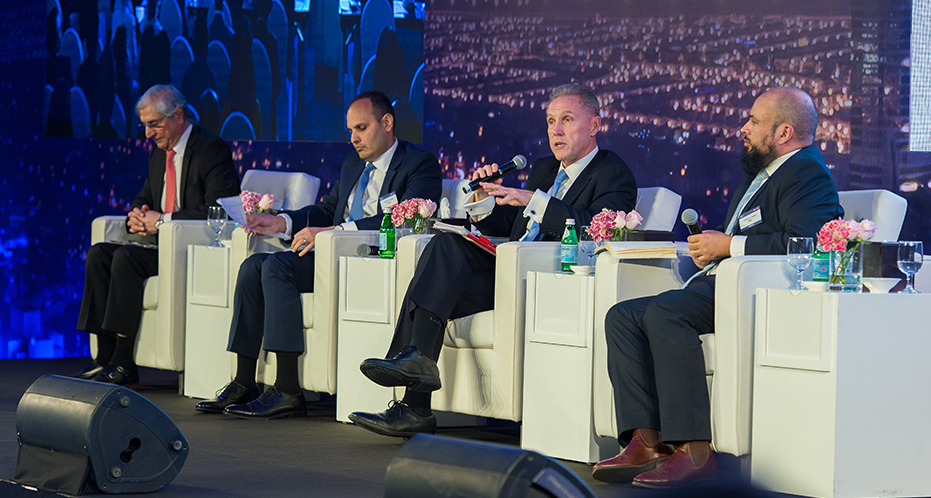Driving commercial and political engagement between Asia, the Middle East and Europe
Driving commercial and political engagement between Asia, the Middle East and Europe
Driving commercial and political engagement between Asia, the Middle East and Europe

The global trading system is experiencing its most profound change since the 1950s, delegates at Asia House’s major conference in Dubai heard this week.
In a panel focusing on the digitalisation of trade, leading industry figures outlined how innovations in technology are set to transform the trading landscape, with one panellist saying the world is at an “inflection point.”
Abhijit Prasad, Managing Director, Global Head of Product Management, GTRF, HSBC, said: “If we think of the last big innovation in the world which transformed how trade was being done, you can trace it back to the 1950s when the container and standardised box was put together. That slashed loading times by 97 per cent.”
Since then, innovations in trade have been “marginal”, he said, but the rapid innovations in tech taking place now promise to revolutionise the trading system.
“We’re at an inflection point now where digitalisation is going to completely transform how trade and trade finance gets offered.”
The blockchain effect
Perhaps the technology driving the biggest change is blockchain – the shared digital ledger which enables all members of a supply chain to see the same data at the same time, thus removing the need for individual records and intermediary audits.
Anthony Butler, Chief Technical Officer for IBM’s blockchain practice in the Middle East and Africa, illustrated the technology’s potential using a real-world example – a research exercise tracing a container of avocados being shipped from Africa to the EU.
“We found that in order for that container to reach the EU and clear customs, there were 30 entities that had to participate in that transaction, there were over 100 people who had to touch that transaction, and there were 200 exchanges of information that took place in order for that simple container of avocados to reach its destination in Rotterdam from Mombasa.
“So we realised there was a potential for blockchain to fundamentally transform the way global trade is executed.”
The cost of trade is roughly US$1.8trillion, Anthony said, with 20 per cent of that cost related to paper such as certificates of origin and customs documents.
“What we were able to do is take all of that and put that on the blockchain, and by doing so we’re already seeing impressive results in terms of removing latency and friction from global trade and also improving visibility and transparency into the container supply chain.”
Technology is therefore set to transform global trade in various ways, from efficiencies to security. A beneficiary of such innovation are customs agencies, which will have a much clearer view of the origin of shipping containers and their contents.
“Even though a manifest might say “toys”, the customs agency can now say ‘well this is coming from a fireworks factory, so we’ll treat that container differently’,” Anthony said. “What blockchain is giving us is more visibility, more transparency and ultimately more trust and more efficiency in our global supply chains.”
Ecommerce across borders
But what about products that don’t physically cross borders? The rise of ecommerce is also driving major change in the trade landscape, Kaiser Naseem, Head of Banking and Digital Finance Advisory Services, MENA, IFC, pointed out.
“The boundaries of these trade flows and the inefficiencies of these trade flows are also disappearing,” as ecommerce grows, he said. “That’s a big factor in the way trade flows are going to develop.”
This was a point Abhijit presented as among the biggest game-changers in the future of trade; it will be data, not containers, crossing borders.
“Technologies like 3D printing are going to change how trade flows move,” he said. “You’re not going to require a good to be transported from somewhere in China to the West – it’s going to be software or data that’s provided form a producer or designer of that good to the purchaser.”
This will, of course, present new challenges around regulation – an issue that is “a big piece of the puzzle,” Michael Lawrence, Chief Executive of Asia House, said.
Moderating the discussion, Michael said: “The push from regulators now is primarily to protect data, and on what some might describe is digital nationalism.”
So how does that square with the rapid innovations taking place?
“Regulators are very interested in the technology because it allows them to have more visibility in those business networks which otherwise will have been very opaque,” Anthony said. “So we’re actually seeing a lot of interest from regulators.”
Emerging markets adopting tech quicker
An engaged audience were given the chance to ask a range of questions during the discussion, on topics from commercial sensitivity in the open world of the blockchain to the culture shifts required for businesses to go fully paperless. The final point, however, concerned how tech advances will play out in different markets.
“Technology for sure is something that will ease the way we do business going forward,” said Kaiser, adding that the millennial generation expects a digital environment. But for Anthony, “most of the challenges,” this digital transition brings will come in “mature markets.”
“I think the interesting thing we’re seeing is that the technology will be more aggressively adopted in the emerging world,” providing the opportunity for these economies to “leapfrog,” more established markets – another factor contributing to the new global trader order.
The New Global Trade Order conference, held in partnership with DMCC, was sponsored by HSBC.
#GlobalTradeOrder
